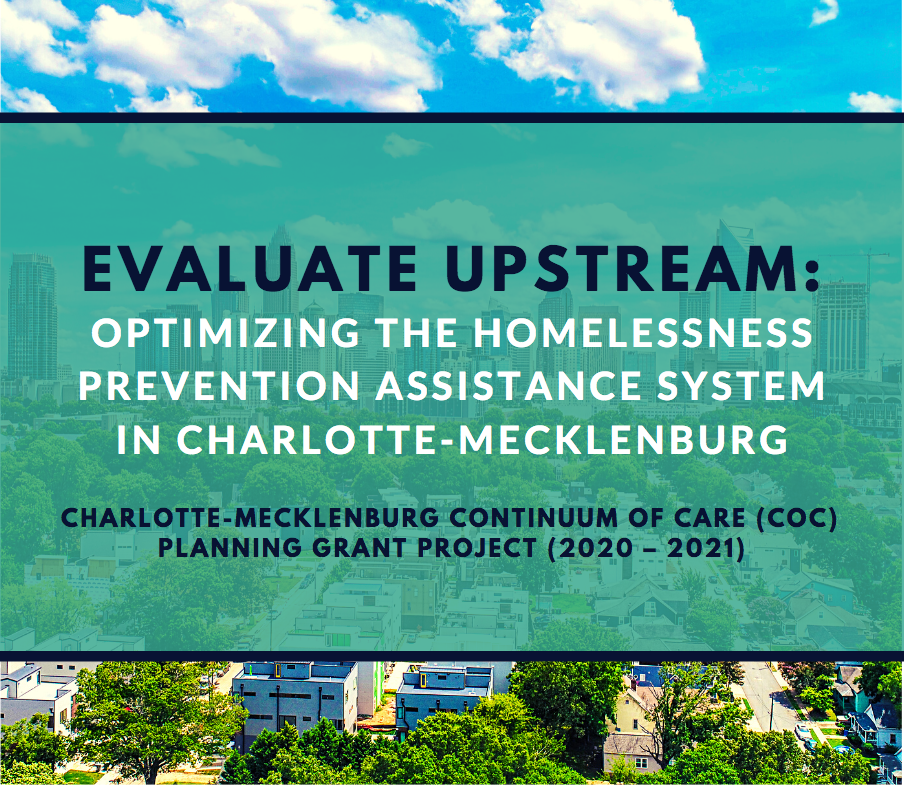Rosalyn Allison-Jacobs
ROI Impact Consulting
The problem of housing instability and homelessness has taken center stage in Charlotte-Mecklenburg amidst an unabated pandemic. Reports of increases in homeless encampments and families with children paying week-to-week to stay in hotels are stark evidence of a worsening crisis. In the health and safety interests of families and the entire community, there is an evident and urgent need to address the lack of available and affordable permanent housing.
Historically, communities have focused on sheltering and re-housing people experiencing homeless as quickly as possible. This makes sense: access to sustainable, permanent housing is the antidote to homelessness. However, we know little about the effectiveness of community systems, structures, and resources in helping households that are precariously housed avoid homelessness in the first place.
In May 2020, Mecklenburg County Community Support Services launched a community project called “Evaluate Upstream: Optimizing the Homelessness Prevention Assistance System” focused on homelessness prevention. The project is funded by a Continuum of Care (CoC) planning grant from the U.S. Department of Housing and Urban Development (HUD). The goals of the project are to document existing prevention resources across Charlotte-Mecklenburg and determine whether and how they work together; to design an optimally functioning prevention network; and to develop an evaluation framework for a homelessness prevention system that is truly impactful in Charlotte-Mecklenburg.
This blog post will share in-depth information and updates about the planning grant project; it will also describe the project’s unique approach to the work and what it could mean for Charlotte-Mecklenburg.
PROJECT PHASES & APPROACH
Evaluate Upstream will unfold in five phases over the course of a year, as follows:
Phase I
Conduct a homelessness prevention resource inventory mapping and outline national and global best practices in prevention research.
Phase II
Undertake an Appreciative Inquiry approach to document firsthand stories of how individuals and families experiencing housing instability manage to avert homelessness.
What is Appreciative Inquiry (AI)? AI is a philosophy of change management that is strengths-based and grounded in positive psychology. One of AI’s key underlying principles is that what we choose to study makes a difference; if we choose to focus on what’s broken, our orientation will be problem-centered. Alternatively, if we choose to study and build on strengths and what is working or has worked in the past, we will support and do more of it. We will use Appreciative Inquiry to understand how households experiencing housing instability manage to avert homelessness. We will integrate the positive, core findings from Appreciative Inquiry with Design Thinking as we shift to Phase III.
Phase III
Employ Design Thinking to reimagine a highly coordinated and impactful prevention network.
What is Design Thinking? Design Thinking (DT) is an iterative, solutions-driven, and prototype-based approach to problem solving, based on a deep understanding of the people for whom solutions to homelessness prevention are being imagined. For this work, DT will be employed to redesign how Charlotte-Mecklenburg might integrate, invest, and expand on the resources that are currently working well in support of those who are struggling to maintain housing. AI and DT, which are both human-centered design approaches, are highly compatible; therefore, Phases II and III of the project will blend together almost indistinguishably. David Phillips of Faster Glass will be leading this phase of work.
Phase IV
Plan for how to reform systems and structures that impact homelessness. Although much of the data collection in Phases II and III will be focused on the resourcefulness and resilience of households that are or have experienced housing instability, this work would be incomplete if we ignored the systems and structures that have created and contribute to the current housing crisis. Therefore, Phase IV uses a racial and gender equity lens to examine policies, systemic barriers, community norms, financing mechanisms, and other structural factors that must be reformed if a truly impactful homelessness prevention network is to be created.
Phase V:
Develop a comprehensive evaluation framework and methodology. Finally, the strength and effectiveness of a holistic homelessness prevention network is only as good as its ability to be evaluated. The final project phase will develop an evaluation framework and methodology that aligns with the prevention network’s planned components, and will capture measures of community ownership and successful execution of the plan.
SO, WHAT
There are several components of the Evaluate Upstream’s project design that represent a different approach to this type of work. Using an Appreciative Inquiry approach flips the lens from a focus on what is not working to what helped; incorporates all levels of stakeholders into co-creators, with shared ownership for change; and illuminates solutions previously thought implausible or impossible.
Interviews with households who have faced or are currently facing housing instability and the frontline staff who support them lift up individual stories of crisis and resilience. In addition, analysis of systems and structures sheds light on the foundation that has led to and perpetuates housing instability. This both/and kind of approach makes the development of program-level and policy-level solutions possible.
For more information and updates about the prevention project, visit the project page via this link.
SIGN UP FOR BUILDING BRIDGES BLOG
Rosalyn Allison-Jacobs is an Organization Development, Change Management, and Process Improvement consultant working in the public, non-profit, and philanthropic sectors. Mecklenburg County Community Support Services (CSS) has contracted with ROI Impact Consulting to carry out the work of the Charlotte-Mecklenburg Continuum of Care (CoC) planning grant.


